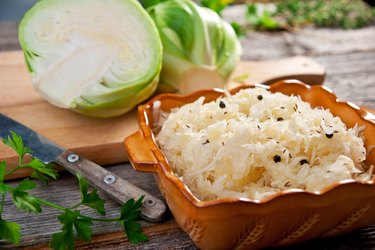
Gut health is buzzy (who would have thought?), and probiotics, while certainly a big part of an optimal microbiome, seem to be added to everything lately. But what exactly are probiotics, and are they actually as important as everyone makes them out to be?
We asked registered dietitians to explain probiotics' health benefits, who should take probiotic supplements and how you can put more probiotics on your plate. Read on for everything you need to know about the good-for-you gut bugs.
Video of the Day
Video of the Day
What Are Probiotics, Exactly?
Probiotics are living microorganisms (or microbes) that naturally exist in the GI tract and also occur in some foods. Contrary to popular belief, probiotics are bacteria and/or yeast, not whole foods. That is, certain foods contain probiotics, but they aren't probiotics themselves.
Probiotics are considered the "good" kind of bacteria. That's because they confer countless health benefits, like improved digestion and immunity, per Harvard Health Publishing.
The gut (i.e. your small and large intestines) naturally houses both good bacteria — probiotics — and bad bacteria, such as C. Diff, a bacterial strain that induces severe diarrhea and inflammation in the colon.
The gut typically contains some 100 trillion (yep, trillion) bacteria, according to Harvard Health Publishing.
That sounds like a lot, right? But here's the thing: "Although the digestive tract naturally produces probiotics, it's beneficial to also consume more foods naturally rich in probiotics to increase your levels and the variety of strains of the good bacteria in the gut," explains Rebecca Ditkoff, RDN, a New York City-based registered dietitian who specializes in digestive health. More on that in a minute.
Related Reading
Why Do You Need Probiotics?
How much time do you have? Jokes aside, there are countless health benefits of probiotics. One of the most obvious advantages of probiotics is their ability to keep the microbiome in balance. Let's break it down.
When you get sick, there is an uptick in the amount of pathogenic, or bad, bacteria hanging out in your digestive tract. Probiotics help knock out the bad bacteria and restore a healthy ratio of good to bad bacteria within the gut.
But that's just the beginning. "We know that the gut microbiome affects multiple body systems including the digestive system, immune system, endocrine system and central nervous system," says Kristy Del Coro, RDN, a Maine-based registered dietitian and co-founder of the Culinary Nutrition Conference.
Research has already shown that gut health likely:
- Affects the body's immune response. It's estimated that some 70 percent of immune cells are housed in the gut, per a September 2008 article in Clinical and Experimental Immunology.
- Helps regulate metabolism. Bacteria in the gut are responsible for converting non-digestible carbohydrates, or fiber, into short-chain fatty acids that serve as a source of fuel for intestinal cells and also may prevent bowel disorders, per the Harvard T.H. Chan School of Public Health.
- Plays a role in obesity prevention. Some research has linked a reduction in microbial diversity in the gut with a greater risk of obesity, per a 2019 review article in Nutrients.
- Helps maintain blood sugar. A higher concentration of certain bacterial strains in the gut is linked to increased risk of type 2 diabetes, while others have been linked to a lower risk. Bifidobacterium, for example, has repeatedly been associated with type 2 diabetes prevention, per a January 2020 review in the journal EBio Medicine.
- Contributes to mental health. Probiotics may bolster the body's production of mood-enhancing hormones like serotonin, per a February 2017 review in the Annals of General Psychiatry. "There is also a growing body of research looking at probiotics and their impact on mental health," Ditkoff says. "A small study done on the probiotic strain Bifidobacterium longum found that it decreased depression scores, but did not reduce those for anxiety."
The Best Probiotic Foods

"The gut microbiome is literally and figuratively the core of overall health, so eating foods that are good for the microbiome is good for your health," Del Coro says.
Probiotics naturally occur in some fermented foods, but, they can also be added to foods. "Different groups of probiotic bacteria and yeasts you may see on food labels include Lactobacillus, Bifidobacterium and Saccharomyces boulardii," Del Coro says.
These foods have naturally occurring probiotics:
- Yogurt
- Kefir
- Miso
- Tempeh
- Kimchi
- Kombucha
- Sauerkraut
Some easy ways to incorporate these foods in your diet are to use yogurt instead of mayo for homemade tuna or chicken salads, throw sauerkraut or kimchi on top of grain bowls and salads and add miso to salad dressings and sauces, Del Coro says.
"Just remember to consume probiotics raw," Del Coro says. "The cooking process kills the live beneficial bacteria in these foods."
One more thing: If probiotics are new to you, start slow. "If you aren't used to eating a lot of fiber and then load up on foods like kimchi and sauerkraut, you may experience increased gas or bloating," Del Coro notes. Those with digestive issues like Crohn's or IBS may also have trouble tolerating probiotic-rich foods.
Related Reading
How Do I Know if I Need Probiotics?

While probiotic supplements can be beneficial for some, they "aren't formally recommended," per Harvard Health Publishing. Prioritize foods that contain probiotics instead of probiotic supplements, especially if you have GI issues, Ditkoff says.
Certain probiotic strains have been highlighted for their potential role in improving GI issues like gas, bloating and constipation. But hold off on loading up on probiotics for tummy issues, per June 2020 recommendations from the American Gastroenterological Association (AGA).
"The AGA's new guidelines did not recommend using probiotics for most digestive conditions," Ditkoff says. "The society said there was insufficient evidence to make recommendations on the use of probiotics to treat C. Diff, Crohn's disease, ulcerative colitis or IBS."
Probiotic supplementation is also not recommended for people who are critically ill, immunocompromised or taking immunosuppressants, according to the National Center for Complementary and Integrative Health.
But, there's solid evidence that adults and children on antibiotics to prevent C. Diff, infants with a low birth weight and people with a condition called pouchitis (inflammation of the pouch created by surgery for ulcerative colitis), can benefit from taking a probiotic, per the Mayo Clinic.
Probiotics may also help maintain oral health, manage certain skin issues like eczema and decrease certain allergies in children, per the AGA.
Some probiotics, such as Bifidobacterium longum, have been shown to help people with constipation, per the U.S. Department of Health and Human Services.
The bottom line: There's potential for probiotics supplements to improve or worsen GI symptoms depending on the person and their condition. After all, our microbiomes are highly individualized and the exact same treatment can affect two people differently.
How to Choose a Probiotic Supplement
As with most health recs, there are no one-size-fits-all guidelines when it comes to choosing the right probiotic supplement.
They're effective at varying amounts, Ditkoff says. "Scientific studies have determined health benefits from 50 million to more than 1 trillion CFUs per day." CFUs stands for colony-forming units; it's a measure of the concentration of microbes in a probiotic supplement. In other words, "a probiotic with higher CFUs doesn't necessarily equal better quality or effectiveness," Ditkoff says.
There's still research to be done on which probiotic strains are best for specific conditions. Lactobacillus rhamnosus, the strain found in the brand Culturelle's probiotic supplements, has been shown to reduce the severity and duration of antibiotic-associated diarrhea and acute infectious diarrhea, Ditkoff says. More research is also needed regarding the best strains for other conditions, like depression.
The smartest approach to supplementation: Run it by your doctor or registered dietitian so that they can help you determine if a supplement is right for you and recommend a trusted brand. Be picky about your source, as supplements are not tightly regulated.
Shopping for a Probiotic?
How to Replace Good Bacteria After Antibiotics
If your doctor prescribes antibiotics to clear up a bacterial infection, they'll likely kill the bacteria that make you sick but might also destroy your beneficial intestinal bacteria, causing diarrhea or other uncomfortable tummy troubles.
But you can replenish good bacteria after antibiotics by eating probiotic foods (like yogurt, kefir, kimchi or sauerkraut) or by taking a supplement.
A May 2012 study in the Journal of the American Medical Association found that taking probiotics can reduce antibiotic-associated diarrhea.
If you decide to take a probiotic supplement, follow the dosing instructions on the label and refrigerate the supplement to maintain its quality. If you're experiencing any side effects from antibiotics, including diarrhea, talk to your doctor.
- Harvard Health Publishing: "Can Gut Bacteria Improve Your Health?"
- Clinical & Experimental Immunology: "Allergy and the Gastrointestinal System"
- Frontiers in Pharmacology: "The Role of Gut Microbiota in Atherosclerosis and Hypertension"
- Harvard Health Publishing: "Should You Take Probiotics?"
- American Gastroenterological Association: "Probiotics: Diagnosis, Treatment & Support"
- Harvard Medical School: "Health Benefits of Taking Probiotics"
- EBio Medicine: "Role of Gut Microbiota in Type 2 Diabetes Pathophysiology"
- The Annals of General Psychiatry: "The Effects of Probiotics on Depressive Symptoms in Humans: A Systematic Review"
- Nutrients: "The Role of Probiotics and Prebiotics in the Prevention and Treatment of Obesity"
- Harvard T.H. Chan School of Public Health: "The Microbiome"
- Gastroenterology: "Probiotic Bifidobacterium longum NCC3001 Reduces Depression Scores and Alters Brain Activity: A Pilot Study in Patients With Irritable Bowel Syndrome"
- American Gastroenterological Association: "AGA Does Not Recommend the Use of Probiotics For Most Digestive Conditions"
- The National Center for Complementary and Integrative Health: "Probiotics: What You Need To Know"
- Mayo Clinic: "Pouchitis"
Is this an emergency? If you are experiencing serious medical symptoms, please see the National Library of Medicine’s list of signs you need emergency medical attention or call 911.